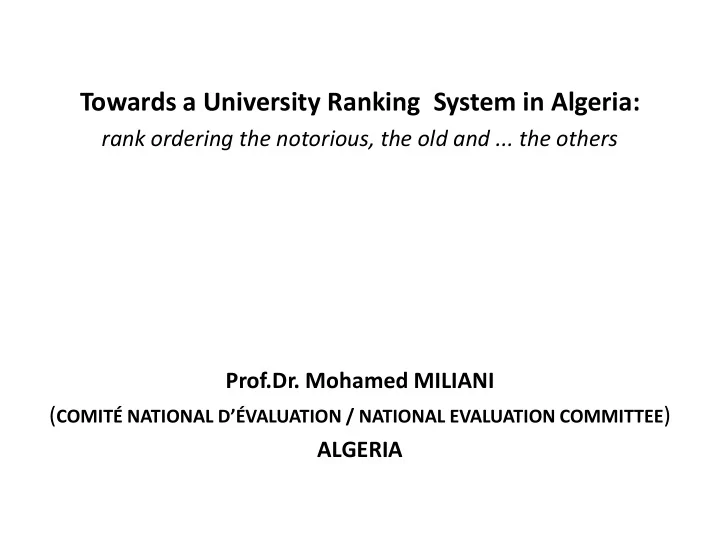

Towards a University Ranking System in Algeria: rank ordering the notorious, the old and ... the others Prof.Dr. Mohamed MILIANI ( COMITÉ NATIONAL D’ÉVALUATION / NATIONAL EVALUATION COMMITTEE ) ALGERIA
Introduction Talking about university rankings systems entails answering a series of legitimate but pressing questions: Are we obliged to surrender to the university rankings logic ? Is there a need to use a global benchmark to assess universities’ progress? Is ranking of any value to the institutions? How can a rankings system deal with a complex structure of HE like the one in Algeria ( 45 universities, 10 university centres, 4 university annexes, not to mention 19 écoles nationales supérieures, 5 écoles normales supérieures 10 écoles préparatoires, 2 écoles préparatoires intégrées)? So, is there an alternative to ranking? Are we not in a new education order that uses dictates its agenda?
IS A RANKING SYSTEM: NECESSARY OR INEVITABLE? Even within a public service, it is NECESSARY because: * It will work as a benchmark not just for the university’s reputation but also the government’s and the university’s policy and HE practices * It will develop self-evaluation mechanisms * It will install nationally recognized self-evaluation tools (reference tools: to support a national reform (LMD reform 2004) It is INEVITABLE because: one feels that it is high time the country as much as the universities did the housework, that is to say harmonise the system for TRANSPARENCY and VISIBILITY sake. The higher education system seems to be still difficult to lay people to read it and comprehend its ins and outs mostly after the 2004 LMD Reform.
A VALID AND RELIABLE RANKING SYSTEM: SCOPE AND LIMITS From a philosophical viewpoint, this can be possible only if there is a PARADIGM SHIFT : from a logic of MEANS to an obligation of RESULTS. • The VALIDITY issue will respond to the question: COMPETE FOR WHAT? The S tate has total MONOPOLY on degrees awarding • Its main function will be to check if the universities meet accepted criteria . Among these, one needs to assess the teaching criterion. Its RELIABILITY will depend highly on the weighing of indicators, but also on the data collected. CAN ONE RELY ON SELF-REPORTED DATA? • RELIABILITY will entail the complementary on-site visits . One thing which seems problematic is the place of students as stakeholders (politicized student unions). • NATIONAL VISIBILITY will have to go beyond the structural differentiation between universities vs. university centres . The ranking system will have to fight against the strongly engrained stereotypes that cling to the repeated distinction between the OLD (MOTHER) universities (Algiers, Oran, Constantine), the more PROACTIVE universities (USTO, Tlemcen, USTHB), and the PACK of universities lagging behind (the others).
• Establishing a national rankings system will need to limit the damaging effects of a CENTRALIZED higher education system . • Bigger shares must be given to the PRIVATE SECTOR : complementary schemes for teaching exist at pre-school, primary and even secondary levels, over 200 institutions: since 2008 for universities. • The TOP-DOWN CENTRALIZED education system needs reforming to facilitate the implementation of a national rankings system. • international world visibility suffers from a LINGUISTIC BIAS , if not a LINGUISTIC DIVIDE : Arabic or even French hardly compete with English and this is detrimental to the wish and capacities of universities to appear in the Shanghai ARWU, the THEWUR, or the QSWUR system. • Besides, one also questions the usefulness of ranking systems based on RESEARCH PRODUCTIVITY (case of SARWU) when research conditions are not optimal in our countries. • a period of CONTINUOUS INTERNAL EVALUATION is a good alternative to international ranking in order to instill a culture of nationally competitive universities. • DEMOCRATIZATION and massification have postponed the struggle for excellence . Necessity to introduce an ENDOGENOUS SYSTEM of ranking . Universities ’ ultimate aim should be less to compete or excel but gain and MAINTAIN CREDIBILITY . • Building a NATIONALLY CONGRUENT SYSTEM of EDUCATION (3 cycles) is a priority. • PLEA for a regionally-agreed rankings system for post-secondary institutions improvement. VITAL in a world where MOBILITY has become a leitmotiv and the universities’ biggest challenge more demanding than the simple appearance in a world rankings system.
Perspectives • Avoid the BANDWAGON EFFECT ! • Settle for good, the PRINCIPLE of Quality education • Enter healthy competitive ranking systems fully equipped and aware • Envisage the switch from ranking systems to new metrics less in money terms and more in terms of values .
Recommend
More recommend